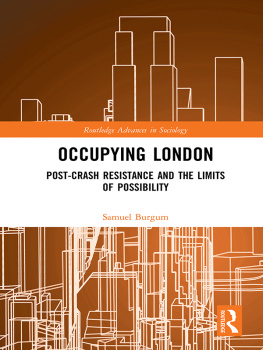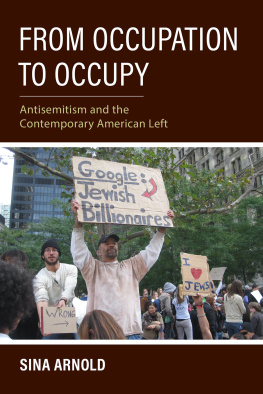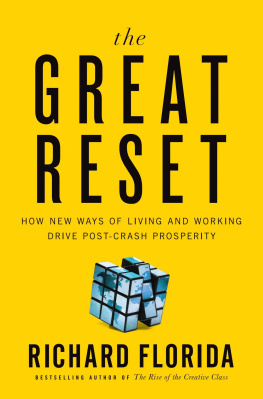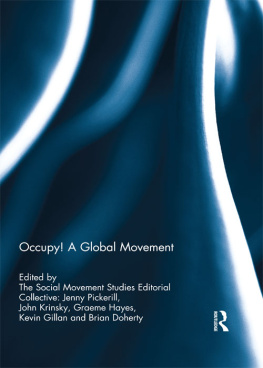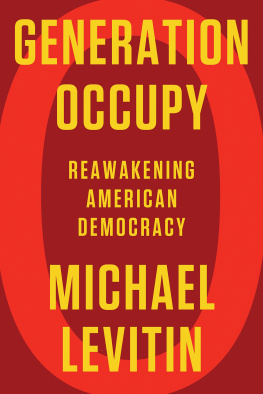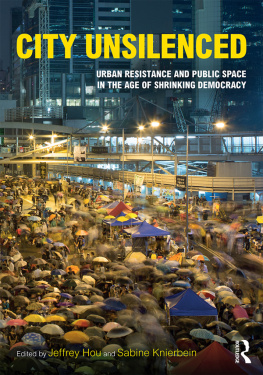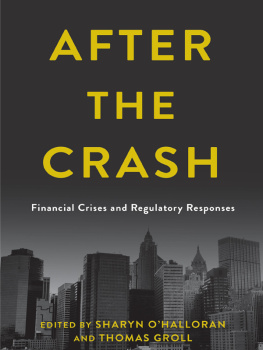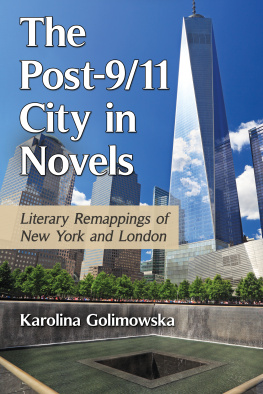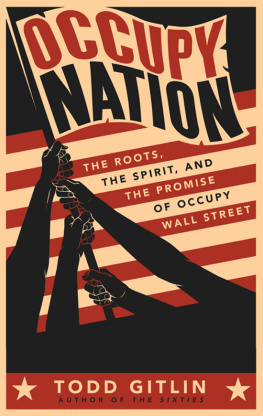Sam Burgums ethnography of the Occupy movements longest enduring encampment at Finsbury Square explains not only why the movement failed but what its failure means nearly a decade after the movements end. Occupy held out the possibility of change but it didnt change our sense of the possible. Instead, its emphases on individualism, libertarianism, and identity reaffirmed core tenets of neoliberalism and reinvigorated accompanying racisms and nationalisms. This important work is crucial reading for anyone interested in contemporary political theory, social movements, and the need for progressive change.
Professor Jodi Dean, author of Crowds and Party
Occupying London gets inside the movement that believed there is an alternative to the excesses, inequalities and moral blankness of the world we inhabit. Through meticulous fieldwork Burgum offers a balanced and reflective assessment of the protest and those involved in it. This book raises important questions about the limits of resistance, social imagination and a system that, despite our anger and dissatisfaction with it, we are apparently unable to see beyond.
Professor Rowland Atkinson, Chair in Inclusive Societies, University of Sheffield
This outstanding book draws on fieldwork with Occupy (in) London to consider the possibility of resisting neoliberalism in the post-crisis period. It centres on the curtailment of politics by neoliberal precepts that operate as common sense, and offers a vital contribution to our understanding of this problem and how we might move beyond it.
Professor Nicholas Gane, Department of Sociology, University of Warwick
In October 2011, tents appeared in central London as Occupy took up its place in the city, and protestors articulated a widespread and angry confusion as to why and how capitalism retained such a grip despite the financial crash and crunch of 2007/8. Through vivid description and careful attention to the voices of the protestors, Sam Burgum takes his readers to the Occupy London encampments, sharing the stories he was told and the experiences he shared. He offers us an honest, unromantic account, capturing the hope and excitement of the movement as well as its disappointments and failures. Anyone interested in the possibilities and challenges of political resistance should read this book.
Dr Cath Lambert, Associate Professor of Sociology, University of Warwick
Occupying London
Just because there has been a crisis does not necessarily mean that change will follow. And yet why, exactly, did nothing change in the face of global resistances and movements which followed the financial meltdown of 2007/8? Based on ethnographic research on the Occupy movement in London as a case study of one post-crash attempt to bring about alternatives this book argues that change was ultimately foreclosed by widespread common sense limitations of what was considered possible after the crash.
Offering a critically constructive analysis of the Occupy movement in London and incorporating the activists praise and indeed self-criticism of the movement, Occupying London discusses both the political potential suggested by the occupation of space and the slogan we are the 99%, as well as the problematic extension of post-crash normativity into the movement through issues of organisation, repetitions of wider norms, and an inadvertent acceptance of wider distributions of possibility. Such positives and negatives are shown to have played out in a wide range of arenas: from the occupation of space itself, through attempts to organise collective appearance and voice, as well as authentic constructions of resistance and cynical framings of power.
The authors intention is to provoke thought on behalf of any half-fascinated, half-devastated witnesses of the financial crash and the political disappointments which followed. It is argued that such movements possess the potential to bring about progressive change, but only if they intervene into wider distributions of common sense by embracing collective symbolic efficiency and avoiding binary framings of authentic resistance vs. hidden power.
Samuel Burgum is a Leverhulme Research Fellow at the Department of Urban Studies and Planning, University of Sheffield, UK, conducting research into squatting in the context of Londons housing crisis. You can follow Sam on Twitter (@sjburgum) or read more about the project at: samuelburgum.uk.
Routledge Advances in Sociology
The Live Art of Sociology
Cath Lambert
The Sociology of Central Asian Youth
Choice, Constraint, Risk
Mohd. Aslam Bhat
Indigenous Knowledge Production
Navigating Humanity within a Western World
Marcus Woolombi Waters
Time and Temporality in Transitional and Post-Conflict Societies
Edited by Natascha Mueller-Hirth, Sandra Rios Oyola
Practicing Art/Science
Experiments in an Emerging Field
Edited by Philippe Sormani, Guelfo Carbone & Priska Gisler
The Great Transformation
History for a Techno-Human Future
History for a Techno-Human Future
Occupying London
Post-Crash Resistance and the Limits of Possibility
Sam Burgum
Populism and the Crisis of Democracy
Volume 1: Concepts and Theory
Edited by Gregor Fitzi, Jrgen Mackert and Bryan S. Turner
Populism and the Crisis of Democracy
Volume 2: Politics, Social Movements and Extremism
Edited by Gregor Fitzi, Jrgen Mackert and Bryan S. Turner
Populism and the Crisis of Democracy
Volume 3: Migration, Gender and Religion
Edited by Gregor Fitzi, Jrgen Mackert and Bryan S. Turner
For a full list of titles in this series, please visit www.routledge.com/Routledge-Advances-in-Sociology/book-series/SE0511
Occupying London
Post-Crash Resistance and the Limits of Possibility
Samuel Burgum

First published 2018
by Routledge
2 Park Square, Milton Park, Abingdon, Oxon OX14 4RN
and by Routledge
711 Third Avenue, New York, NY 10017
Routledge is an imprint of the Taylor & Francis Group, an informa business
2018 Samuel Burgum
The right of Samuel Burgum to be identified as author of this work has been asserted by him in accordance with sections 77 and 78 of the Copyright, Designs and Patents Act 1988.
All rights reserved. No part of this book may be reprinted or reproduced or utilised in any form or by any electronic, mechanical, or other means, now known or hereafter invented, including photocopying and recording, or in any information storage or retrieval system, without permission in writing from the publishers.
Trademark notice: Product or corporate names may be trademarks or registered trademarks, and are used only for identification and explanation without intent to infringe.
British Library Cataloguing in Publication Data
A catalogue record for this book is available from the British Library
Library of Congress Cataloging in Publication Data
Names: Burgum, Samuel, 1988- author.
Title: Occupying London : post-crash resistance and the limits of possibility / Samuel Burgum.
Description: Abingdon, Oxon ; New York, NY : Routledge, 2018. | Series: Routledge advances in sociology | Includes bibliographical references.
Identifiers: LCCN 2018003828| ISBN 9781138291539 (hardcover) | ISBN 9781315265254 (ebook)

